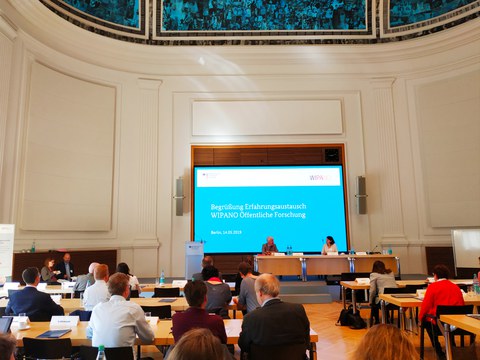May 17, 2019
Exchange of Experience WIPANO Public Research

Exchange of experiences WIPANO Public Research 13 - 14 May 2019 in the BMWi
From 13 May to 15 May, the two-day exchange of experience and workshops on "WIPANO Public Research" took place at the Federal Ministry of Economics and Energy in Berlin. The aim of the BMWi's innovation policy is to promote the emergence of innovations and their rapid dissemination through knowledge and technology transfer. WIPANO - "Knowledge and technology transfer through patents and standards" supports the economic exploitation of innovative ideas and inventions from public research through the efficient securing and use of intellectual property. On the other hand, the conversion of the latest research results into norms and standards is promoted. 150 participants from various research institutions, patent exploitation agencies and representatives of the ministries exchanged views on various topics in the fields of transfer and protection of intellectual property rights. The Transfer Office of TU Dresden took part in the event in technical discussions and discussions.
Dr.-Ing. Eschenbrenner (Ascenion), Mr. Schöninger (BETTEN & RESCH) and Dr. Conny Clausen (Saarland University) conducted workshops on the subject of "Securing industrial property rights in the software sector". Dr. Kulicke (ISI), the Fraunhofer Gesellschaft and Ms. Marschall (UKE Hamburg) also conducted the workshops on "Further development of the transfer strategy "Development of indicators". This was followed by a lecture followed by a discussion on the transfer initiative of the BMWi by Dr. Mertins. On the second day, Dr. Kulicke and the ISI Fraunhofer Gesellschaft presented the results and WIPANO evaluation. In a further series of workshops, the topic "Utilization - internal aspects of higher education (recording costs / dealing with revenues)" was finally dealt with. The workshop was led by Dr. Wilken (University of Leipzig) and Mrs. Dürkop (University of Bremen).
The event was very well received by all participants and Dr. Wirth (BMWi) is optimistic about the future: "We are striving for another WIPANO funding period, including the results of the WIPANO evaluation. We assume that the funding intensity for the programme can be kept constant."
